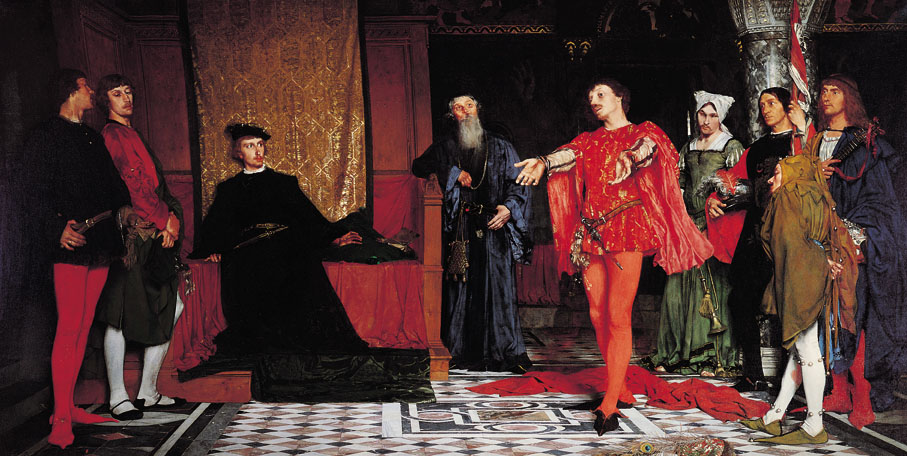
Caption: Actors before Hamlet (Act II, Scene 2 (scroll down ∼ 80 %) of Hamlet (c. 1601)), Wladyslaw Czachorski (1850--1911), 1875.
Left to right: Rosencrantz and Guildenstern, Hamlet, Polonius, Player King, Player Queen, Spear Carrier, Rigoletto, Albrecht Duerer (1471--1528).
From a bit earlier in Hamlet:
-
Welcome, dear Rosencrantz and Guildenstern!
Moreover that we much did long to see you,
The need we have to use you did provoke
Our hasty sending. Something have you heard
Of Hamlet's transformation; ...
-
---Claudius,
Act II, Scene 2 (at top)
of Hamlet (c. 1601),
William Shakespeare (1564--1616).
I'll just assume it's all true.
Rosenkrantz would later meet Johannes Kepler (1571--1630). The link between Kepler and Shakespeare is thus established---I knew there had to be one. They may never heard of each other---although Kepler's fame as Imperial Mathematician (i.e., essentially court astrologer) to the Holy Roman Emperor Rudolf II (1552--1612, reigned 1576--1612) may have penetrated to England---but there was only 1 degree of separation (see Wikipedia: Six degrees of Separation).
In 1600,
Rosenkrantz
was down on his luck---he'd had
an affair with
Danish
lady-in-waiting
Rigborg Brockenhuus (1579--1641)
who got pregnant.
Weighed against the
centuries, this seems small enough---but as
Hamlet remarks
Rigborg was sentenced to
life imprisonment---but
was eventually let out and allowed to live with her
son Holger.
Rosenkrantz
was banished and ordered join the war against
the Ottmoman Empire
(must be
Long Turkish War (1593--1606))---in other words,
ordered
to go on a crusade.
It was on the "road to Jerusalem"
that he visited Tycho
in 1600
April.
Rosenkrantz
died in 1602 in
duel---he was
trying to stop it, NOT fight it.
I believe it is absolutely certain
that in 1592
in his earlier adventure to England,
Rosenkrantz
and his sidekick
Gyldenstierne
(see
Alien images file:
alien_rosencrantz.html
and the figure above
(local link /
general link: alien_rosencrantz.html))
were noticed by
Shakespeare as
archetypical
Danish noblemen.
Maybe Shakespeare
saw them in a parade or maybe they were merely spoken of in the
Mermaid Tavern.
But somehow they caught his attention
and Shakespeare
cast them---I know it's them---in bit parts in
Hamlet.
In the 20th century,
Tom Stoppard (1937--)
gave them---I know it's them---title roles
(also starring roles) in
Rosenkrantz and Guildernstern are Dead (1966).
It is fitting that
Rosenkrantz
has become an immortal.
For a bit more detail:
Kepler in
1600 during
his first period with Tycho Brahe
met with
Rosenkrantz,
Tycho's
third cousin
(Thoren 1991, p. 427--429;
Casper 1993, p. 107--108).
Since Kepler traveled
briefly with Rosenkrantz,
they must have communed at least a little.
Like Tycho,
Rosenkrantz
was of the
Danish nobility
and was highly educated.
Tycho
reports that he knew
Latin,
Italian,
French,
Spanish,
and German---and
he spoke Danish---but
no mention of English.
Credit/Permission:
Wladyslaw Czachorski (1850--1911)
1875,
photographer
www.sztuka.com.pl
(uploaded to Wikipedia
by User:Szczebrzeszynski,
2010) /
Public domain.
... conception is a
blessing;
but not as your daughter may conceive.
Friend, look to't.
---
Act II, Scene 2
(scroll down ∼ 30 %)
of Hamlet (c. 1601),
William Shakespeare (1564--1616).
Image link: Wikipedia:
File:Czachórski Actors before Hamlet.jpg.
Local file: local link: kepler_shakespeare.html.
File: Kepler file:
kepler_shakespeare.html.